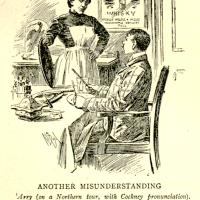I have the opportunity to use C.S. Lewis’ The Screwtape Letters in an undergraduate class. One of the assignments that I give them is to create a “Screwtape Letter for a New Generation”—their own, unique, contemporary spiritual formation advice or critique of culture from a demonic perspective. Despite the fact that Screwtape is written 70 years ago by a British evangelical academic and our students are generally culturally religious,  nonreligious, post-Christian, anti-theistic or generically spiritual, the assignments they write on Screwtape show the surprising relevance of the original letters.
nonreligious, post-Christian, anti-theistic or generically spiritual, the assignments they write on Screwtape show the surprising relevance of the original letters.
The students’ original letters are a great mix of tackling pet peeves, commenting on morality, and scratching cultural itches. Some of the more creative ones tend also to be the most incisive in their understanding of a cultural moment, but they all reveal truth. As you read this, there is a new crop of insightful undergrads from across the disciplines and with a variety of backgrounds trying to recreate the decrepit voice of Screwtape (or Pukewart, or Azazel, or Twigmentia, or Z-Ro). As a resource to them—and since I have not been able to find a similar bibliography, to anyone else curious about the way that The Screwtape Letters has created a new genre of diabolic epistolary fiction—I offer this note.
First, I’ll present a brief list of blogs and web postings of contemporary letters. It seems that the internet is the perfectly Luciferian place for “Screwtape Emails.” Second, I’ll list a number of books and academic articles that follow Lewis’ lead. Some of these I’ve read, while others sit on my “to do” list.
Screwtape Emails
Most of the contemporary Screwtape letters I’ve found do what Lewis intended to do, which was cause Christians to think about their spiritual formation. Popular theologian Douglas  Groothius writes two contemporary letters on his blog. “Education, for Hell’s Sake” and “Luciferian Laptop” are well-written letters about the subtle way technology forms us. “Screwtape Writes Again” is an early (2005) blog where “Mouse” has “found a fragment of another letter of Screwtape’s, though to a different tempter. The letter captures the intriguing dance between self-awareness and self-reliance. A similar theme is captured on Philip Ritchie’s blog, and Hugh Williams deals with temptations one can experience just by going to church, similar to letters 2-3 of The Screwtape Letters.
Groothius writes two contemporary letters on his blog. “Education, for Hell’s Sake” and “Luciferian Laptop” are well-written letters about the subtle way technology forms us. “Screwtape Writes Again” is an early (2005) blog where “Mouse” has “found a fragment of another letter of Screwtape’s, though to a different tempter. The letter captures the intriguing dance between self-awareness and self-reliance. A similar theme is captured on Philip Ritchie’s blog, and Hugh Williams deals with temptations one can experience just by going to church, similar to letters 2-3 of The Screwtape Letters.
There are also fuller Screwtape treatments available online. Laurel Robinson claims in the Boundless webzine that “[I] was able to hack my way into the sent mail folder of Screwtape’s e-mail account,” revealing a contemporary temptation narrative in the same vein of Lewis’ original. Similarly, M.C. Pinney’s, “The Screwtape Emails” are funny notes from Oct-Nov, 2010 and are essentially about the core temptations of a Christian life. From the reverse angle, much like Jim Peschke’s eBook, The Michael Letters, Christos Jonathan Seth Hayward gives us the heavenly angle on Christian growth with “The Angelic Letters.”
angle, much like Jim Peschke’s eBook, The Michael Letters, Christos Jonathan Seth Hayward gives us the heavenly angle on Christian growth with “The Angelic Letters.”
A number of the new generation Screwtape letters were about particular issues. Tobias Stanislas Haller wrote an Anglican critique, suggesting that hell had already won in dividing the Anglican community so, and drawing them away from their core commitment. William A. Stanmeyer taps into a key Creationist argument with “Screwtape on Devilution.” Not only is the title clever, but the “letter” contains powerful claims:
“Coupled with a complex mix of intellectual dross wrapped in shiny phrases and published by shallow but prideful human minds, the theory of general evolution was sold to most of the “intellectuals” during the latter of the last human century and well into the present century.”
The tenor of this note is very Screwtapian, even though Lewis himself found that evolution was the best explanation for the material history of things. It puts me in mind of Ira Hutchison’s 1992 book, Screwtape: Letters on Alcohol. Screwtape new  disciple, Rotbranch, is attempting to corrupt human lives through alcohol addiction. While Lewis was a great beer drinker (and pipe smoker), part of Screwtape’s strategy is to take good things, pleasures, and allow them to consume the soul. I’m not sure, though, that Stanmeyer would think of evolution as a “good thing” gone bad.
disciple, Rotbranch, is attempting to corrupt human lives through alcohol addiction. While Lewis was a great beer drinker (and pipe smoker), part of Screwtape’s strategy is to take good things, pleasures, and allow them to consume the soul. I’m not sure, though, that Stanmeyer would think of evolution as a “good thing” gone bad.
While C.S. Lewis was not overly political himself, some of the contemporary Screwtape copycats takes on a political angle. “The Attritionist Letters” are a number of letters about war published in the Marine Corps Gazette (collated in 2011). Naomi Camilleri writes a single email within in the 2008 US election context (can you guess which male & female patients are targeted?). Adam Graham plays on this theme in The Screwtape Reports (Lulu Pub, 2005), where “Dave Screwtape” is a Democratic political consultant who sends out memos advising various Democratic political leaders and groups on how to achieve political success. These kinds of themes are captured well in Peter Wehner’s chapter, “A Screwtape Letter for the Twenty-First Century: What a Senior Devil Might think about Religion and Politics” (p 41-45 in What’s God Got to Do With the American Experiment? Washington: Brookings Institution Press, 2000)—it is a critique of American Christianity worth exploring.
Disciples of Screwtape in Print
It was not long after The Screwtape Letters became popular—and long before Lewis wrote the sequel, “Screwtape Proposes a Toast”—that the Screwtape genre was used as a creative writing technique. In 1948, F.L. Wells at the Department of Hygiene at Harvard wrote “The Beans of St. Botolph’s” in American Imago as a psychoanalytical look at heaven. Pyschoanalysis might seem like a stretch, but it is not the only psychological approach—see “The Anticreativity Letters: Advice From a Senior Tempter to a Junior Tempter” by Richard E. Nisbet” in American Psychologist (Sept 1990: pp. 1078-1082)—it is an early example of a trend. T here are a number of Screwtape-style letters concerning education by Adventists (Cheri Elder Gregory) and Lutherans (Glenn Kuck) that follows Lewis’ critique in Screwtape’s “Toast” and apply it to contemporary pedagogy and administration. And in 2011, J.J. Shea wrote “Stone Tool Analysis and Human Origins Research: Some Advice from Uncle Screwtape” (Evolutionary Anthropology 2011 Mar-Apr; Vol. 20(2), pp. 48-53), available here. I think Lewis would have chuckled about that one
here are a number of Screwtape-style letters concerning education by Adventists (Cheri Elder Gregory) and Lutherans (Glenn Kuck) that follows Lewis’ critique in Screwtape’s “Toast” and apply it to contemporary pedagogy and administration. And in 2011, J.J. Shea wrote “Stone Tool Analysis and Human Origins Research: Some Advice from Uncle Screwtape” (Evolutionary Anthropology 2011 Mar-Apr; Vol. 20(2), pp. 48-53), available here. I think Lewis would have chuckled about that one
Granted that creationists like Stanmeyer might struggle with  the authenticity of an evolutionist using the genre, many Christians might struggle with the idea of an atheistic unconversion narrative, like Mary Eberstadt’s The Loser Letters: A Comic Tale of Life, Death, and Atheism (Ignatius Press, 2010). I’ll save my comments on this one, though, for my review at the beginning of May.
the authenticity of an evolutionist using the genre, many Christians might struggle with the idea of an atheistic unconversion narrative, like Mary Eberstadt’s The Loser Letters: A Comic Tale of Life, Death, and Atheism (Ignatius Press, 2010). I’ll save my comments on this one, though, for my review at the beginning of May.
There are, of course, a number of traditional Christian Screwtape-styled books released by Christian leaders since Lewis’ death in 1963. Walter Martin, legendary anti-cult activist, wrote Screwtape Writes Again (Santa Ana, CA: Vision House, 1975) to tackle divisive issues like gossip, pornography, homosexuality, and the modern Charismatic movement. Not long after, L’Abri leader, professor, and popular Christian author Os Guinness wrote The Gravedigger File: Papers on the Subversion of the Modern Church (Grand Rapids: IVP, 1983). It is a critique of “the  present-day irrelevance, bickering, factionalism, marketing, and paranoia that are strangling the lifeblood out of the Church in America” (Amazon review). It is largely an unknown book—not even listed in Wikipedia’s entry on Os Guinness—and he follows up with a more overt critique in 1993 with Dining With the Devil: The Megachurch Movement Flirts With Modernity (Grand Rapids: Baker, 1993).
present-day irrelevance, bickering, factionalism, marketing, and paranoia that are strangling the lifeblood out of the Church in America” (Amazon review). It is largely an unknown book—not even listed in Wikipedia’s entry on Os Guinness—and he follows up with a more overt critique in 1993 with Dining With the Devil: The Megachurch Movement Flirts With Modernity (Grand Rapids: Baker, 1993).
More well known are popular Catholic philosopher Peter Kreeft’s, The Snakebite Letters: Devilishly Devious Secrets for Subverting Society as Taught in Tempter’s  Training School (Ignatius Press, 1993). Kreeft is highly intelligent and truly funny, a great re-interpreter of Lewis. Kreeft’s work on Lewis is worth spending time on. There are other Screwtapian letters, like Larry Richards’ The Screwloose Lectures: Studies in the Ethics of Hell (Word, 1980), as well as more contemporary emails, like Arthur H. Williams, Jr’s The Screwtape Email (Trafford Publishing, 2006). However, I think that Kreeft’s work stand unanswered as being true to Lewis’ original work.
Training School (Ignatius Press, 1993). Kreeft is highly intelligent and truly funny, a great re-interpreter of Lewis. Kreeft’s work on Lewis is worth spending time on. There are other Screwtapian letters, like Larry Richards’ The Screwloose Lectures: Studies in the Ethics of Hell (Word, 1980), as well as more contemporary emails, like Arthur H. Williams, Jr’s The Screwtape Email (Trafford Publishing, 2006). However, I think that Kreeft’s work stand unanswered as being true to Lewis’ original work.
This bibliography, as well as the student response, is part of a project entitled, “Screwtape for a New Generation.” Please feel free to contact me if you think something is missing from this list, or if there are resources that I should be aware of—including your own blog.






















What an excellent analysis of a fascinating–and significant–subject. Thank you very much!
Thanks Rob
Pingback: 70th Anniversary of the Screwtape Letters | A Pilgrim in Narnia
Pingback: 70th Anniversary of the Screwtape Letters: A Nefarious Nod to our Favourite Degenerate Demon | A Pilgrim in Narnia
Good analysis, I thought the Screwtape Letters was political in the sense that Lewis made a point of demonizing the public schools in Screwtape Proposes a Toast. I also thought Lewis pointed out the evils of collectivism in Screwtape Letters.
I am the wife of the author of The Michael Letters Heaven’s answer to Screwtape. I wanted to point out the full title and let you know it is available in paperback as well. The book is sold around the world.
I would like to encounter The Michael Letters, and am waiting for it to be available in ePub format (I have a Kobo reader).
I think Screwtape is critical of most any -ism that will divide the attention and draw loyalty–the critique of the “party man.” Screwtape took great pleasure in anything purely materialistic (naturalistic) too.
Pingback: Dorothy Sayers’ Sluckdrib Letter: The First Screwtape Copycat | A Pilgrim in Narnia
Hello! edkgdbc interesting edkgdbc site! I’m really like it! Very, very edkgdbc good!
Hello! afebekd interesting afebekd site! I’m really like it! Very, very afebekd good!
Hello! acedddg interesting acedddg site! I’m really like it! Very, very acedddg good!
Pingback: Teaching Screwtape for a New Generation at CSLIS Colloquium | A Pilgrim in Narnia
Pingback: Hitlerian Haunting in Screwtapian Logic | A Pilgrim in Narnia
Pingback: “Once Upon a Dreary Era”: A Review of Peter Kreeft’s Critical Essay On C.S. Lewis | A Pilgrim in Narnia
Pingback: The Difference Between Pressure & Discipline: My Reflection on my 100th Post | A Pilgrim in Narnia
Pingback: Peter Kreeft on Hell (Hell Series Part 2) | A Pilgrim in Narnia
I don’t think you got Lord Foulgrin’s Letters, by Randy Alcorn.
Nope–I’m missing a few things, plus the ones in 2012. Are Alcorn’s letters good?
I only read the free excerpts, but they seem quite good. There is also One Devil To Another, not sure who wrote it, and I haven’t read any of it. I think Bill Flaherty would know.
Pingback: Teaching Screwtape for a New Generation: My Conference Talk | A Pilgrim in Narnia
Pingback: Is Today International Screwtape Day? | C.S. Lewis Minute
I am thinking of teaching Screwtape to my Senior Bible class this next year and I am interested in how you assess it, do you use a rubric? I want them to read it and have some way for me to keep them accountable to read it and actually think about it beyond just a quiz, and I like the modern screwtape letters assignment. What advice would you give having done this before?
Anything you could tell me would be great
Also are you familiar with “The Fleetwood Correspondence”? I picked it up at a local bookstore that has an Inklings and a wanna be Inklings section.
Not sure why my other comment did not show up, so I will try again, if this is a repeat feel free to delete the other.
I am going to teach Screwtape in the fall and I was wondering what advice you would give me. I am teaching it to Seniors at a private Christian High School. I like the modern letter idea, but I wondered how that worked for you. Also what other assignment ideas do you have for this incredible little book. Did you use a rubric? Did you assign all the letters at once or more thematically?
Thanks
Also are you familiar with “The Fleetwood Correspondence”? I picked it up at a local bookstore that has an Inklings section and a wanna be Inkling section (which is where this one was).
Hi! Sorry, I’m camping, so I haven’t been actually online. Email me at junkola [at] gmail [dot] com and let’s chat about your teaching. I’d also like to hear about Fleetwood–I haven’t seen it.
There’s also Herbert O’Driscoll’s “Confound Them” (Anglican Book Centre, 2000).
Wow, I didn’t know that one! It will only take me 20 years to get them all read!
Pingback: 2014: A Year of Reading | A Pilgrim in Narnia
Pingback: How I Stumbled into C.S. Lewis (“On Pretending to be in a PhD” pt. 1) | A Pilgrim in Narnia
Pingback: Snigsnozzle: The First Screwtape Copycat by Charles Williams | A Pilgrim in Narnia
Pingback: Dorothy Sayers’ Sluckdrib Letter: Not The First Screwtape Copycat … But Close | A Pilgrim in Narnia
Pingback: Teaching Screwtape for a New Generation: My Conference Talk & Paper | A Pilgrim in Narnia
Pingback: Good C.S. Lewis Studies Books That Did Not Win the Mythopoeic Award: Part 3: Literary Studies on C.S. Lewis | A Pilgrim in Narnia
Pingback: Textpassage mit Dialog zwischen Teufeln nicht von «Narnia»-Autor Lewis – netzzeitung.
Pingback: “The 80th Anniversary of C.S. Lewis’ The Screwtape Letters” by Brenton Dickieson | A Pilgrim in Narnia
Pingback: Pixel Scroll 2/11/22 They’re Creepy And They’re Scrolly, The Pixel Family | File 770